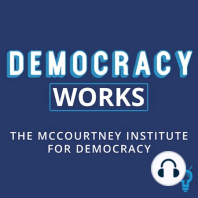5 min listen

What Serial taught Sarah Koenig about criminal justice — recorded live at Penn State
FromDemocracy Works
What Serial taught Sarah Koenig about criminal justice — recorded live at Penn State
FromDemocracy Works
ratings:
Length:
34 minutes
Released:
Apr 29, 2019
Format:
Podcast episode
Description
Sarah Koenig spent a year inside Cleveland’s criminal justice system for season three of the Serial podcast. Along the way, she met some interesting people and had a birds-eye view of what justice (and injustice) look like for lawyers, judges, defendants, police officers, and the countless others who pass through the building’s courtrooms each day.It’s once thing to study criminal justice empirically, as many academics do, but something else entirely to be embedded within the system as Koenig and her team were in Cleveland.We invited Koenig to Penn State for an on-stage conversation with Democracy Works host and McCourtney Institute for Democracy Director Michael Berkman. They discuss community policing, the lack of data about what works and what doesn’t, and where college students should focus their energy if they’re looking to reform the criminal justice system.Additional InformationSerial podcastCornell’s Peter Enns about the U.S. as the world’s most punitive democracyUNC’s Frank Baumgartner on race and policingA note to our listeners in the New York City area: Jenna Spinelle will be participating in a panel called “Podcasts to the Rescue! An Emerging Medium for Learning About Civics, Government, and the Social Contract” on Thursday, May 30 at the Metropolitan New York Library Council. The event is free and open to the public. We would love to meet you!Discussion/Reflection QuestionsIf you’ve listened to Serial season 3, what did you find most surprising?Which part of the criminal justice system do you think is most in need of reform?How should that part of the system change?How much discretion should judges have when it comes to sentencing?What kind of data is needed to understand how to reform the criminal justice system?What is the relationship between law and justice?Interview Highlights[2:45] What about this season of Serial do you think captured people’s attention?We tried to do what we know how to do, right? Which is to know how to make it narrative, as narrative as we could, and to introduce difficult concepts kind of slowly and not overload you with information. It’s become a topic that people are talking about and caring about in the last however many years and that’s personally a thrill to me, but I think that helps. The timing of it helped.[3:54] Does season 3 relate to season 1?A lot of people after season 1 were like “Well, what does this mean about the whole system? Can you extrapolate?” And it felt like, well that, no you can’t extrapolate off of one case that is pretty extraordinary. So it really did feel like, well let’s just go look and see the ordinary stuff. What is the baseline functionality of our system in a very, kind of day to day, mundane way, honestly. Let’s treat the courthouse as an office.[6:10] What did you learn about the police in Cleveland?So it was just a very typical, I mean if you read about for example, what’s happening in Baltimore, what’s happened in some other places. And it seems like the places where there has been any successful, true successful outcome from those consent decrees, I think Seattle has actually had a pretty good result if I’m not mistaken. It’s where they get buy-in from the police union, and it’s hard. In a place like Cleveland it’s very hard. It’s very old school. It’s very like, “Don’t tell me how to do my job, I put my life on the line every day.”[9:40] What do people in Cleveland think about the idea of community policing?They see the value of it and they think it’s valuable and they don’t want to be the people who, in a place like Cleveland, all you do is just get in your car and just race from call to call to call to call. And half the time, you’re at a call trying to deal with something and you get a call for a more major thing and so you’re ripped away, so then that person that you’re trying to help is like, there goes my guy. So, it’s bad for everyone, that kind of policing. They, they want it and they want, I think, to be able to have real interaction wi
Released:
Apr 29, 2019
Format:
Podcast episode
Titles in the series (100)
What is Democracy Works?: From the McCourtney Institute for Democracy at Penn State, this is Democracy Works. In this episode, hosts Michael Berkman and Chris Beem take a few minutes to explain why we wanted to start this podcast and what we hope to achieve through our interviews and conversations. by Democracy Works